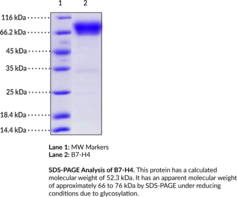Territorial Availability: Available through Bertin Technologies only in France
- Correlated keywords
- B7H4 B7CD28 CD-28 nonlymphoid costimulatory VTCN 1 AA IgG
- Product Overview:
B7-H4 is a glycoprotein linked to the cell membrane via glycosylphosphatidylinositol (GPI) and a member of the B7-CD28 immune checkpoint protein family.{57243} It is composed of an extracellular domain containing immunoglobulin (Ig) variable (IgV) and Ig constant (IgC) domains with several cysteine residues and N-glycosylation sites.{57242,57243} B7-H4 is found on T cells, B cells, natural killer (NK) cells, dendritic cells, monocytes, and tumor cells, and B7-H4 mRNA is expressed in non-lymphoid tissues such as the lungs, testis, and pancreas.{57243,57244,57245} The expression of B7-H4 is induced by inflammatory mediators and cytokines, and it acts as a co-stimulatory molecule to promote regulatory T cell development and inhibit T cell activation, cell cycle progression, proliferation, and cytokine production.{57243,57244} VTCN1 is overexpressed in a variety of cancers, including breast and ovarian cancers, and the levels of expression correlate with lymph node metastasis, cancer progression, and mortality.{57245,57246} siRNA knockdown of VTCN1, the gene encoding B7-H4, decreases proliferation and migration of pancreatic cancer cells in vitro.{57246} Knockout of VTCN1 in mice reduces lung metastasis and increases survival in a metastatic breast cancer mouse xenograft model. Cayman’s B7-H4 (human, recombinant) protein can be used for cell-based assay applications. This protein is a disulfide-linked homodimer. The reduced monomer, comprised of B7-H4 (amino acids 29-258) fused to human IgG1 Fc at its C-terminus, consists of 471 amino acids and has a calculated molecular weight of 52.3 kDa. As a result of glycosylation, the monomer migrates at approximately 66 to 76 kDa by SDS-PAGE under reducing conditions.
Cayman Chemical’s mission is to help make research possible by supplying scientists worldwide with the basic research tools necessary for advancing human and animal health. Our utmost commitment to healthcare researchers is to offer the highest quality products with an affordable pricing policy.
Our scientists are experts in the synthesis, purification, and characterization of biochemicals ranging from small drug-like heterocycles to complex biolipids, fatty acids, and many others. We are also highly skilled in all aspects of assay and antibody development, protein expression, crystallization, and structure determination.
Over the past thirty years, Cayman developed a deep knowledge base in lipid biochemistry, including research involving the arachidonic acid cascade, inositol phosphates, and cannabinoids. This knowledge enabled the production of reagents of exceptional quality for cancer, oxidative injury, epigenetics, neuroscience, inflammation, metabolism, and many additional lines of research.
Our organic and analytical chemists specialize in the rapid development of manufacturing processes and analytical methods to carry out clinical and commercial GMP-API production. Pre-clinical drug discovery efforts are currently underway in the areas of bone restoration and repair, muscular dystrophy, oncology, and inflammation. A separate group of Ph.D.-level scientists are dedicated to offering Hit-to-Lead Discovery and Profiling Services for epigenetic targets. Our knowledgeable chemists can be contracted to perform complete sample analysis for analytes measured by the majority of our assays. We also offer a wide range of analytical services using LC-MS/MS, HPLC, GC, and many other techniques.
Accreditations
ISO/IEC 17025:2005
ISO Guide 34:2009
Cayman is a leader in the field of emerging drugs of abuse, providing high-purity Schedule I-V Controlled Substances to federally-licensed laboratories and qualified academic research institutions for forensic analyses. We are certified by ACLASS Accreditation Services with dual accreditation to ISO/IEC 17025:2005 and ISO Guide 34:2009.





